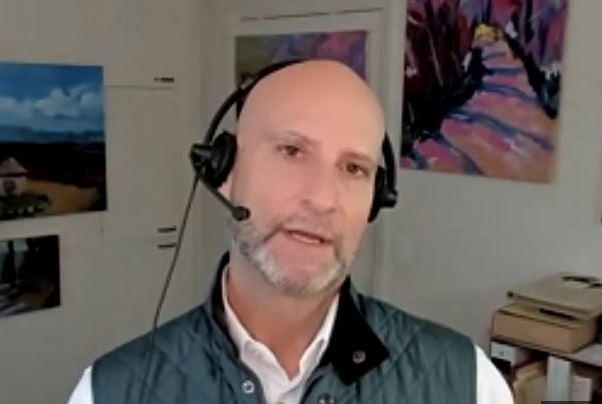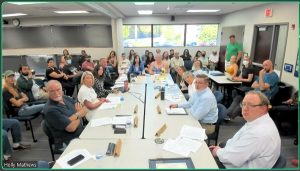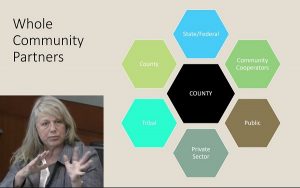Kevin Alltucker: Here’s how Eugene can approach homelessness
15 min read
Eugene has learned a great deal about homelessness in recent years, and one of our local leaders—bridging nonprofits and the University, local government and law enforcement, the justice system and the business community—visited recently with KEPW Whole Community News to talk about his work with the Chamber of Commerce and about his past and current projects.
Kevin Alltucker: I’ve lived most of my life in Eugene. Not quite born here, but certainly raised here. And my parents were volunteers in the community and they really instilled that idea of helping to make your community better wherever you live. And so my dad was just really consistent about that. He says, ‘I don’t care what your means are. You have the responsibility wherever you live to help make it better for everyone.’ And he demonstrated that through his actions. And he was a business owner here in Eugene and did a lot of volunteer things. That’s kind of where it came from.
[00:01:00] I’ve had two professional careers. One is a construction engineer, and I did that for 20 years and then a volunteer experience changed my professional trajectory.
[00:01:12] My wife and I started volunteering with the Relief Nursery, which is a child abuse prevention organization here in town. We started volunteering, I think it was ’91. And we’ve been involved with the Relief Nursery ever since in various capacities. We both became board members; I became president of the board; my wife eventually became the executive director of the Relief Nursery for a period of time. And so the volunteer experience of the Relief Nursery has been instrumental in both my wife and my professional career.
[00:01:45] It is such a spectacularly successful program that’s been replicated now in the state. I’m going to say over 30 times, but when I started with a nursery, there was one and it was at 25th and Chambers in Eugene. And that was it. And since then it’s grown tremendously, because the public recognizes just the common sense of it. And lawmakers have also pushed funding state funding towards it because they recognize, hey, prevention is a lot better than after-the-fact treatment.
[00:02:20] I was a construction engineer at the time, and when I started volunteering with the Nursery, I was both horrified that children and families in our community were experiencing all sorts of really challenging situations, but I was also ashamed because here it was in my own backyard, a place where I grew up and I wasn’t aware of the depth of—and the complexity of the challenges—that many of our families were facing and continue to face.
[00:02:49] And so I was a little bit sheepish about, ‘Gosh, I’ve grown up in a middle-class privileged white family, and why is it that I didn’t know about these things?’
[00:03:01] So I went back to school. I got a PhD in education from the University of Oregon and became a professor at the U of O for nearly 20 years, and I was mostly a classroom teacher which I dearly loved in the Family and Human Services program in the College of Education and I just was inspired daily by my students.
[00:03:27] My research was investigating the effects of early childhood trauma, specifically abuse and or neglect, researched it, which led me to becoming a certified Inside Out instructor.
[00:03:43] Inside Out is a national program. U of O has one of the largest chapters, I guess that you might call it, but the Inside Out program is where classes are held inside prison and half the class are, in this case, U of O students. We call ’em the outside students. And half the class were folks who happened to be incarcerated and lived in the prison. And we call them the inside students—hence the name: Inside Out. And I still volunteer teach for the University of Oregon inside prison. I was just in prison Monday night helping out a colleague with their class.
[00:04:23] When people ask me—colleagues or friends—and they say, ‘Well, you know what’s the reason that people end up in prison? Is it drugs? Is it alcohol? Is it mental health?’ My answer is just really clear and direct. My experience with my inside students is that all of them, 100%, and I can say that because I know they disclose their lives to me in their writings, 100% experienced early childhood trauma and some level of low family functioning.
[00:04:57] The term ‘dysfunctional family’ is really an inaccurate term. ‘Dysfunctional family’ really describes every single family, mine included, maybe yours, because every family has a little bit of dysfunction in it, right? So I like to describe families in a way of either ‘low-functioning’ or ‘high-functioning.’ And when families are well-supported and well-resourced and oftentimes well-privileged, then they have a better opportunity to be higher-functioning than not.
[00:05:32] There’s a ton of research out there that higher-functioning families have better outcomes. They produce higher-functioning human beings, right? So higher education outcomes, employment, financial health, both mental and physical, and interestingly, kids coming from higher-functioning families are able and they have the ability to create healthy relationships with other human beings.
[00:06:01] And that starts talking about the soft skills, they’re called—not the reading, writing and arithmetic skills—but the emotional skills. You know: Kids in school learn how to regulate their emotions in a group setting; We raise our hands, we ask for permission there. We conform to the social norms of the situation where, so kids who have been supported and have higher-functioning parenting—and that can be a single parent and that can be a double parent or a mixed family. That doesn’t really matter. The issue is whether the family unit is high-functioning or not.
[00:06:38] My original research was looking at the effects of the age of first arrest. I looked at a cohort of around 700 youth that had gone through the Oregon Youth Authority, which is the state juvenile justice system, and found that if the youth had experienced abuse and or neglect, they were four times more likely to be arrested before age 14 than youth that did not experience abuse and or neglect.
[00:07:12] Now age 14 is kind of this number that keeps bubbling up in the research. And this is why it’s important. So if a person is arrested prior to age 14, they’re much, much more likely to be involved in the adult criminal system.
[00:07:28] And so there’s a term for that group, and they’re called ‘early starters.’ Early starters are characterized by aggression, low social skills, hanging out with what are called ‘negative peers,’ a lack of pro-social skills, early involvement with drugs and alcohol—and certainly an involvement with the juvenile justice system—but they’re much more likely to continue their criminality and end up in the adult criminal system.
[00:08:00] As I was leaving the U of O, the City of Eugene reached out to me and asked if I would be the project manager for the Community Safety Initiative. And I had a little time on my hands ’cause I was departing the U of O and I said, ‘Yeah, sure.’ So that was in 2018 and I served in that role for four years, so until 2022. And I helped shepherd the successful adoption of the Community Safety Initiative and the associated payroll tax.
[00:08:33] So I was known to be a person who was involved with community safety / public safety, and the (Eugene) Chamber (of Commerce) reached out to me in 2020, because Brittany (Quick-Warner) was interested in putting together a report on the state of homelessness in our community, and she asked me to read a draft. So that’s how it started. And since then the report has been published. It’s available on the chamber website. It’s called the State of Our Homelessness Crisis Report.
[00:09:06] And it outlines what was known about homelessness in our community at that time and based it on the perspective of, ‘Hey, homelessness is affecting all of us in this community, whether we’re housed or unhoused. And it’s really affecting the business community and it’s in the business community’s best interest to provide leadership on this, and propose a plan to move forward to, to address it in an effective way.’
[00:09:34] That’s how I got started in it. From that process, a group was formed called the Business Leaders Task Force, and I was really interested in participating in that because as far as I knew. There were no other groups that involved business at the table. And I thought that was a gap, a serious gap, that the business voice needed to be represented at the table, of: How do we address this?
[00:10:01] In my own perspective, the first collective response, organized response was from government and service providers and service providers often are not well connected to the business community, in my experience. And service providers don’t sometimes recognize that they’re even leaving the business community out of the conversation. It’s just doesn’t even—sometimes it doesn’t even enter the thought process. And I think that’s wrong.
[00:10:32] The Business Leaders Task Force was meant to be a six- or nine-month effort. And it gave an opportunity for businesses to participate to voice their concerns. But more importantly, I think there was a process that created a shared understanding about the different facets of the problem.
[00:10:52] The term homelessness is so broad that it’s not accurate for one thing, and I think it kind of gets in the way of our ability to have productive conversations, because most people recognize there are different populations within the homelessness population.
[00:11:08] When some people say homelessness, they’re talking about the unsheltered folks that are living under the Ferry Street Bridge, or the folks that are in the Whiteaker unsheltered, and issues of trash and garbage and public sanitation, those kind of things. For other folks, it’s the folks who are sheltered, but they’re couch-surfing with friends and family. To others it means folks who are participating in an emergency shelter or supported housing. I just wish that we had a better way of describing accurately the folks who are actually part of that total population.
[00:11:43] And of course, I don’t think you can solve a problem unless you know: What are the moving parts? What are the levers that we can pull to effect change?
[00:11:51] As you can imagine, this perspective that I’m about to say isn’t unique to the business community. I know this because I participated and helped the City of Eugene with two communitywide surveys about community health. And so I know there are a lot of people in our community that feel this way, and that is: ‘I’m sick and tired of seeing the kind of destruction that unsheltered folks are causing to our community. Why are we letting them do this? Why don’t we lock them up? Law enforcement, take care of the problem.’
[00:12:26] That’s a very common viewpoint. And the corollary to that is: ‘These people, unsheltered folks, have made bad decisions. It’s their own fault. Hey, I work hard and I’m not breaking the law. Why are these folks being allowed to do whatever they want?’ Again, a very common perception.
[00:12:46] So part of the Business Leaders Task Force’s effort was to raise the awareness and education level about, ‘Well, really let’s drill down into the issue and find out what’s going on.’
[00:12:56] Now from that effort, I will say that there is a much better understanding that the root cause, if you will, of homelessness is a lack of housing. I mean, that is the long-term structural, systemic change that needs to be effected in order for us to have a long-lasting, sustainable solution, right?
[00:13:22] ‘Homelessness Is A Housing Problem’ is the title of a book written by two UW profs, and they make a compelling argument where they one by one pick off the kind of stereotypical causes, ranging from ‘If a community like Eugene offers services for unsheltered folks, that causes more people to move in,’ and, ‘Oh we have fairly moderate or temperate weather, so that’s why we have more (homeless).’
[00:13:51] So the authors address that and the case that they make (in a very convincing way) is that in areas that have high rental costs, and low availability / low supply, then those are the areas that are experiencing really high rates of unsheltered homelessness.
[00:14:08] Well, you know, Eugene-Springfield rental rates are high compared to the Area Median Income (AMI). The inventory is low and there’s a lot of folks who are bumped into homelessness because they can’t afford it. And so the long-term systemic change that needs to happen is to build more housing on all levels, but specifically towards affordable housing. And there are many ways to define affordable housing, but it’s mostly based on the area median income.
[00:14:41] There was a study done by ECOnorthwest maybe a couple years ago where they said that 50% of the housing need is below 80% AMI, so half of the housing needs are in that 80% and less area median income.
[00:14:59] The Business Leaders Task Force, we were going through this education campaign and I learned a lot, so that was good. I was like learning new things and discovering, ‘Oh, I don’t have all the information now. This is interesting,’ and so that was the spirit of the process, which was really great. And business folks were participating.
[00:15:18] And I will tell you that that Business Leaders Task Force morphed into another group that has the kind of pretentious name of ‘The Brain Trust.’ And we always laugh at ourselves like, ‘God, we really need a better name here because I don’t know how many brains are really in this process,’ right? But suffice to say, we haven’t come up with another name.
[00:15:44] The Brain Trust group, most of the meetings have been with service providers and Lane County and City of Eugene governments, less so city of Springfield. That’s been really interesting. Which kind of leads to the project that I’m helping Sylvia (Barry) with right now, is that: I’ve always been dismayed by the tone of the conversation. When we talk about the appropriate responses to all homelessness, it quickly devolves into a false dichotomy of: ‘Housing first. Anything that is not Housing First is a waste of money. We shouldn’t even waste any airtime even talking about it.’ So there’s that one side of the spectrum.
[00:16:28] And then the other side of the spectrum is, you know, ‘Lock ’em up, Public Safety, and that’s what we need to do.’ And I’ve been disappointed in kind of the lack of sophistication in that conversation. So what I’m trying to do is say, ‘Look, no, no, no. That’s a false dichotomy. I agree, the long-term systemic change is more housing. But we have street-level, day-to-day situations that we need to address now. So what does that look like?’
[00:16:58] Because I believe that to address the issue of homelessness is going to take tremendous amounts of money—much, much more than have been earmarked. And I think it’s the issue of our generation for sure. And I use the term, ‘We’re going to break our pick on this issue if we don’t push enough money towards the solution.’
[00:17:23] And I’m trying to put together a template for an appropriate response that includes the idea of public safety and accountability. And when I have these conversations with service providers—listen, I taught Family and Human Services for 17 years. I understand the service side of the equation well. But when I say, ‘Let’s talk about public safety and accountability,’ there’s a stiffening of posture and like, ‘Well, we don’t want to talk about that.’
[00:18:01] Or I think people translate that as: ‘Oh, you’re talking about traditional law enforcement response to homelessness,’ which, that’s not what we want to do. And I’m saying ‘No, that’s not what we’re—that’s not what I’m saying. I’m saying this issue is going to take hundreds of millions of dollars. To do that, we’re going to need to raise revenue.’
[00:18:26] That’s likely going to be some sort of increased tax—whole lots of different ways that revenue could be raised. But the fact is that the public, the voting public is going to have to approve that in order for it to happen. Now the voting public is going to be more likely to approve being taxed more, more likely to approve paying more taxes if the street-level, day-to-day public space issues are addressed.
[00:18:56] If we just look at the long-term systemic structural issues of more housing and ignore what’s happening to our community in terms of community harm, in terms of public safety, in terms of public sanitation, then the public’s going to be less likely to be willing to pay more taxes. That’s my working assumption that I’m moving forward with.
[00:19:19] So what would a plan look like? And this is all very preliminary and I’ve got a draft, I’ve met with Chief Skinner with Eugene Police, I’m meeting with Cliff Harrold, Lane County Sheriff, to get their feedback on this approach.
[00:19:36] What I can tell you is we’re not going to jail our way out of or incarcerate our way out of this problem. No. We are not going to ‘criminalize the homeless.’ We’re not going to increase the so-called sweeps. No, that’s not what I’m talking about.
[00:19:54] What I’m talking about is some sort of accountability for the highest-risk individuals. Not highest need, highest risk. Some accountability to the law, some accountability to repairing the harm that’s being done to our community in some sort of restorative way.
[00:20:14] And I’m speaking in very general terms because the details haven’t been agreed on. But that’s how I’m thinking about it. Not a traditional law enforcement response, ’cause we know that can be very, very damaging for unsheltered folks, for a variety of reasons.
[00:20:33] But if we have high-risk individuals—and when I say high-risk, I mean folks who are at high risk of harming somebody else or themselves—then we need to act and we need to act quickly and we need to utilize the existing justice system, including things like the Eugene Community Court which is a fantastic program that not a lot of people know about. It’s just really a nationally-recognized, nationally-evaluated program that’s been shown to be very effective. Things like Lane County Drug Court, Lane County Mental Health Court, these kinds of alternative courts that serve the needs, that meet the needs of high-need individuals. Those are the things that we need to be increasing.
[00:21:19] So part of my proposal is this kind of sorting flowchart, of: Is the person high-risk or is the person high-needs? Because we should address each one of those very differently.
[00:21:31] And I think in the past, the traditional law enforcement response has just been assuming everyone is high risk, right? And we’re just going to go in and do what traditionally law enforcement has done, and it’s just, that’s not a sustainable or effective strategy.
[00:21:47] I’m hoping in the coming months that I’ll be able to put forward a comprehensive kind of template that both service providers, the community, and law enforcement can buy off on.
[00:21:58] Coerced or forced treatment is less successful than voluntary participation in treatment. Yep, that’s right. But if a person is in active drug use, wouldn’t pressing a pause button at least give that individual a time to clear some of the effects of the drugs out of their system so that they can make a better decision?
[00:22:19] I hope I can have some positive influence and effect because I care about our community and I don’t like some of the things that are happening and I don’t like the false dichotomy arguments. No, we’re better than that. We can do a better job of asking questions like a scientist: Don’t attack the person, explore the position.
[00:22:40] I feel privileged to be able to participate in this process because I have the time and a lot of people don’t have the time to do this. I am encouraged by the fact that the Chamber has taken leadership on this issue because the business community has been left out of the conversation.
[00:22:58] And then finally, I truly believe that to address homelessness in any sort of meaningful way is going to take hundreds and hundreds of millions of dollars, which is going to require more revenue, which is going to require public support. And to get public support, we need to address the day-to-day curbside issues that are damaging our community and our neighborhoods. And we need to do that in a responsive and humane and empathetic way.
[00:23:30] John Q: We visited with Kevin Alltucker, whose volunteer experiences with the Relief Nursery changed the course of his life and continue to change the lives of so many others here in Eugene.



